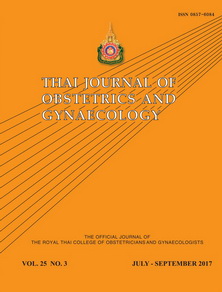Knowledge and Attitude of Obstetricians to the Protection of Children Born from Assisted Reproductive Technology
Main Article Content
Abstract
Objectives: This study aims to examine the attitudes and knowledge of obstetricians in related to the Protection of Children Born from Assisted Reproductive Technologies Act 2015.
Materials and Methods: This was a survey study using a mailed questionnaires sent to 2,550 Obstetricians who were registered with The Royal Thai College of Obstetricians and Gynaecologists (RTCOG) and sent to their registered addresses. The questionnaires consisted of knowledge and attitude questions.
Results: Replies were received from 340 obstetricians with a response rate of 13.3%. Of these Thai Obstetricians, 81.5% had a good attitude to the law while 14.7% and 3.8% respectively had moderate and poor attitude. The majority (56.7%) had a good knowledge of the law, while 37.1% had a moderate knowledge and just 6.2% had a poor knowledge. Nearly one hundred percent strongly agreed that there should be a law to control ART, that the law will help monitor ART and maintain good morals as well as protecting the dignity of attending obstetricians.
Conclusion: The responded obstetricians have a good attitude towards and knowledge of the Protection of Children Born from Assisted Reproductive Technologies Act 2015. The RTCOG should inform nationwide obstetricians about this law and provide data center support.
Article Details
References
2. Mansour R, Ishihara O, Adamson GD, Dyer S, de Mouzon J, Nygren KG, et al. International Committee for Monitoring Assisted Reproductive Technologies world report: assisted reproductive technology 2006. Hum Reprod 2014;29:1536-51.
3. Deonandan R. Recent trends in reproductive tourism and international surrogacy: ethical considerations and challenges for policy. Risk Manag Health Policy 2015; 8:111-9.
4. Howard S. Taming the international commercial surrogacy industry. BMJ 2014;349:g6334.
5. Entwistle G. Gay couple in Thai custody battle over surrogate baby. Published 2015. Accessed February 20, 2016.
6. McCandless J, Sheldon S. The Human Fertilisation and Embryology Act (2008) and the Tenacity of the Sexual Family Form. Modern Law Rev 2010;73:175-207.
7. Petersen K, Baker HW, Pitts M, Thorpe R. Assisted Reproductive Technologies: Professional and Legal Restrictions in Australian Clinics. J Law Med 2005;12: 373-85.
8. Heng BC. Ethical issues in paying for long-distance travel and accommodation expenses of oocyte donors. Reprod Biomed Online 2005;11:552-3.
9. Wainright JL, Russell ST, Patterson CJ. Psychosocial adjustment, school outcomes, and romantic relationships of adolescents with same-sex parents. Child Dev 2004; 75:1886-98.
10. Krueger PM, Jutte DP, Franzini L, Elo I, Hayward MD. Family structure and multiple domains of child well-being in the United States: a cross-sectional study. Population Health Metrics 2015;13:1-11.
11. Yogev Y, Simon Y, Ben-Haroush A, Simon D, Orvieto R, Kaplan B. Attitudes of Israeli gynecologists regarding candidate screening and personal responsibility in assisted reproductive technologies versus adoption in Israel. Eur J Obstet Gynecol Reprod Biol 2003;110:55-7.
12. Stern JE, Cramer CP, Garrod A, Green RM. Attitudes on access to services at assisted reproductive technology clinics: comparisons with clinic policy. Fertil Steril 2002; 77:537-41.
13. Kovavisarach E, Kamut R. Self-Preferred Route of Delivery of Thai Obstetricians and Gynecologists. J Med Assoc Thai 2016;99:S84-S90.


